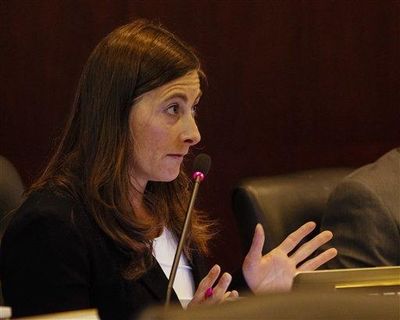Idaho notary law update passes House committee despite Rep. Scott’s warnings of ‘global planning’

BOISE – Routine legislation updating and modernizing Idaho’s notary laws cleared a House committee Thursday after a long debate and over the objection of a North Idaho legislator.
Reps. Heather Scott, R-Blanchard, and Christy Zito, R-Hammett, raised concerns about foreign countries that might be unstable, the Hague Convention and the involvement of the Uniform Law Commission, but failed to kill the bill.
Jeff Harvey, deputy director of the commercial division for the Idaho secretary of state’s office, told the House State Affairs Committee the proposal was drafted over the course of the last year by representatives from the Idaho Bankers Association, Idaho county clerks, the Idaho Land Title Association and the secretary of state’s office.
He said Idaho’s current notary laws were enacted in the 1980s, prior to the advent of the internet, which he said has “given us tools and opportunities.”
The update recognizes the use of electronic signatures and electronic document transfer, but doesn’t allow remote notarizing; a notary still would have to see a person sign a document in order to certify that it was that person who signed it. It replaces current law with a Revised Uniform Law on Notarial Acts.
When Scott asked Harvey about a reference to the Hague Convention, he explained, “The Hague Convention creates essentially a uniformity amongst foreign nations who choose to participate so that documents can cross international borders and be authenticated.”
When the bill was introduced, Scott expressed concerns, saying she believed Idaho had just started adopting uniform laws within the last year or two.
Senate Majority Leader Bart Davis, R-Idaho Falls, an attorney who has been a member of the Uniform Law Commission since about 2001, said, “It goes back to 1892.”
The Uniform Law Commission is a group of more than 300 attorneys, law professors, legislators and judges from across the political spectrum who draft model laws that ease interstate and international transactions. States decide on their own whether to adopt the model laws.
“I’ve been reading some goofy letters to the editor that said it is an NGO of the United Nations,” Davis said recently when asked about the commission. “That is not true. It was formed initially in 1892 for the purpose of being able to have states solve their own problems, instead of having the federal government solve their problems.”
The commission proposes model legislation in areas where uniformity among states is beneficial, including uniform probate codes, uniform commercial codes, and laws on notarial acts, child custody and more.
After Scott and Zito asked numerous questions aimed at Harvey and Deputy Attorney General Adam Warr, Idaho Association of Realtors Government Affairs Director John Eaton spoke, saying the update of the notary act is very important to Idaho Realtors, who frequently transmit official documents electronically, and urging support.
Scott, however, moved to hold the bill in committee. “I spent a little time looking up the Uniform Law Commission, and it’s literally centralized planning for Idaho,” she said. “And to this point where the Hague Convention’s involved, it’s globalized planning for Idaho law. I’m not saying that there’s not good parts of this law, but we as Idaho legislators, it’s our job to write law for the state of Idaho.”
She said she believes lawmakers should not “abdicate this responsibility to centralized planners which are lawyers, and I looked up their meetings, they’re all meeting in Washington and Chicago. That’s not Idaho.”
She said, “I think this is a bad idea to go down this road to allow others to write our laws for us.”
Scott’s motion to hold the bill in committee – killing it – failed on a 3-10 vote, with just Zito and Rep. Priscilla Giddings, R-White Bird, joining her. The bill won the committee’s approval on a voice vote with just Scott dissenting. It moves to the full House.